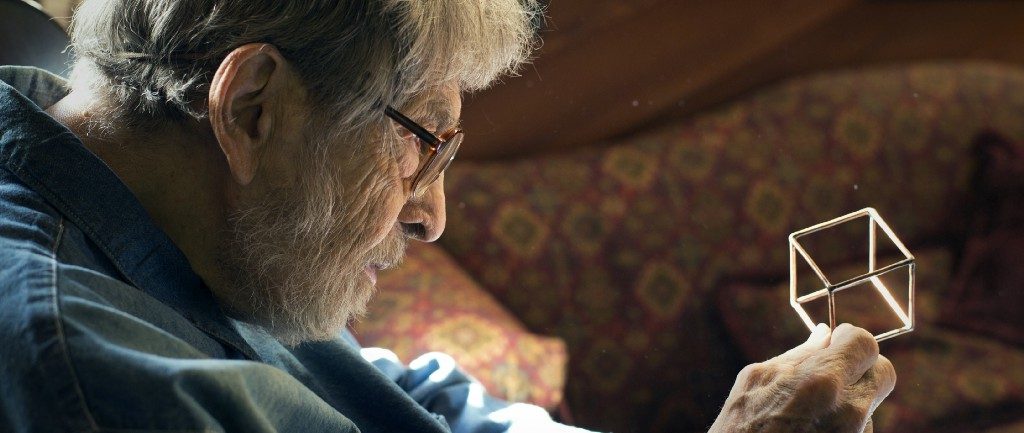Full Frame 2018 Women Directors: Meet Allison Bohl DeHart — “Bending Lines: The Sculpture of Robert Wiggs”
Allison Bohl DeHart is a filmmaker and cinematographer based in Louisiana. Her documentary shorts “I Always Do My Collars First” and “Raised on Rice and Gravy” won New Orleans Film Festival awards. Her other credits include “Lauren is Missing” and “Calponia.”
“Bending Lines: The Sculpture of Robert Wiggs ” will premiere at the 2018 Full Frame Documentary Film Festival on April 6. The film is co-directed by Peter DeHart.
W&H: Describe the film for us in your own words.
ABD: “Bending Lines” is a feature art documentary about the 92-year-old artist and amateur mathematician Robert Wiggs. His work explores the areas that cross over between art, math, and science.
W&H: What drew you to this story?
ABD: My husband and I saw Wiggs’ gallery opening for his retrospective in Lafayette, Louisiana where we live. We were drawn to his artwork, but also extremely drawn to the body posture of him and his wife at the gallery opening. Wiggs’ aging body posture quickly told us a very interesting story about his obsession with his artwork and diligent work ethic.
As we examined his work further, we were even more drawn to discovering more about him and his system. We also live and work in South Louisiana, so the majority of work and stories we get asked to tell usually have something to do with the South Louisiana culture. We loved this project and were drawn to it because it has more of a universal story.
W&H: What do you want people to think about when they are leaving the theater?
ABD: We want it to awaken a curiosity of discovery in the viewer. We want people leaving the theater to re-examine the construction of the natural world around them and to see visual connections and patterns between the clouds in the sky and the mud cracks in the ground.
W&H: What was the biggest challenge in making the film?
ABD: Our biggest challenge was how long it truly takes to make a documentary feature that you are proud of and all the other obstacles that come up along that way: lack of money, letting the story happen versus forcing it, and taking time to wrap your head around the best way to tell the story.
W&H: How did you get your film funded? Share some insights into how you got the film made.
ABD: Since Robert was 92-years-old at the time, we asked someone locally if they could help us with the money for some DSLR gear rental over a weekend, so we could capture Robert in his home before anything changed. This initial funding helped us actually begin. We spent two days in Wiggs’ home filming with a crew of three people.
We did a lot of self funding from there, working to make money through other commercial and client projects to save up income to then use on the film. We were careful about who we approached for funding after that because we had a vision for what type of film it should be and we didn’t want anyone else determining the ultimate outcome.
We worked mostly to self fund it and did not get paid for any of our time. Near the end we needed a some money to travel to film a mathematician. Norman W. Johnson. and we were given donations by a few patrons.
Even once the film is “completed” there are many costs for festivals and marketing so we continue to work to save money to then spend on seeing the film through to further completion.
W&H: What does it mean for you to have your film play at Full Frame?
ABD: I have always had great respect for their programming in the past, so I feel honored to be amongst the programing. We very are thankful to be a part of this year’s New Docs programming.
W&H: What’s the best and worst advice you’ve received?
ABD: Best advice: Make time for personal projects that allow you to explore and discover without an guaranteed outcome.
Worst advice: Do this job now for someone else for the possibility of a paid job later.
W&H: What advice do you have for other female directors?
ABD: My advice is to approach filmmaking first from a position on a crew besides the director. I started in the camera department observing ACs and DPs and also doing a lot of editing. When I finally got to the position of directing, I understood the many positions on a set and could communicate the film’s needs to various departments and crew more easily.
W&H: Name your favorite woman-directed film and why.
ABD: We watched Sophie Fiennes’ “Over Your Cities Grass Will Grow” in preparation for making this film.
That film gave us the courage to slow down the pace of the editing and allow the audience time to absorb the more complicated concepts. I love the visuals in that film and how unapologetically slowly the edit is paced.
W&H: Hollywood and the global film industry are in the midst of undergoing a major transformation. Many women — and some men — in the industry are speaking publicly about their experiences being assaulted and harassed. What are your thoughts on the #TimesUp movement and the push for equality in the film business?
ABD: I think all of these changes and movements in the film industry and other industries are essential. This sheds light on the reality of working in male-dominated industries, and will now hold all of us more accountable to our actions. I also think that this will result in more interesting storytelling and unique perspectives to be shared ahead.







